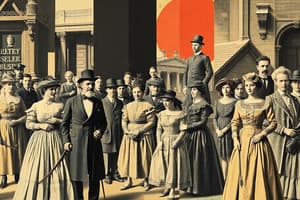Podcast
Questions and Answers
Who is associated with 19th Century Evolutionism and believed that society is like an organism?
Who is associated with 19th Century Evolutionism and believed that society is like an organism?
- Herbert Spencer (correct)
- Karl Marx
- Edward B. Tylor
- Lewis H. Morgan
What drives social evolution according to Edward B. Tylor?
What drives social evolution according to Edward B. Tylor?
Human desire for answers
What is the concept of Neo-Evolutionism primarily associated with?
What is the concept of Neo-Evolutionism primarily associated with?
- Cultural materialism
- Historical particularism
- Dialectical materialism
- Increasing consumption of energy (correct)
What term did Leslie White coin referring to sociocultural change on a global level?
What term did Leslie White coin referring to sociocultural change on a global level?
Who is the key figure behind Historical Particularism?
Who is the key figure behind Historical Particularism?
Which of the following is NOT a Generalist Theory?
Which of the following is NOT a Generalist Theory?
What was Radcliffe Brown's focus in structural functionalism?
What was Radcliffe Brown's focus in structural functionalism?
What does Cultural Materialism attempt to explain?
What does Cultural Materialism attempt to explain?
What do Practice Theory theorists believe?
What do Practice Theory theorists believe?
Who introduced Structural Anthropology?
Who introduced Structural Anthropology?
What is the focus of Symbolic Anthropology?
What is the focus of Symbolic Anthropology?
Flashcards
19th Century Evolutionism
19th Century Evolutionism
A theory suggesting societal evolution parallels biological evolution through various perspectives.
Dialectical Materialism
Dialectical Materialism
Marx's concept emphasizing class struggle and material conditions as drivers of societal change.
Neo-Evolutionism
Neo-Evolutionism
The 1950s theory linking societal development with energy consumption and resource availability.
Sociobiology
Sociobiology
Signup and view all the flashcards
Historical Particularism
Historical Particularism
Signup and view all the flashcards
Cultural Materialism
Cultural Materialism
Signup and view all the flashcards
Structural Functionalism
Structural Functionalism
Signup and view all the flashcards
Practice Theory
Practice Theory
Signup and view all the flashcards
Structuralism
Structuralism
Signup and view all the flashcards
Symbolic Anthropology
Symbolic Anthropology
Signup and view all the flashcards
General Evolution
General Evolution
Signup and view all the flashcards
Study Notes
19th Century Evolutionism
- Herbert Spencer likened society to an organism, suggesting that societal evolution mirrors biological evolution.
- Edward B. Tylor emphasized the intellectualist perspective, positing that human desire for understanding drives social evolution.
- Lewis H. Morgan focused on social relations, particularly kinship, as pivotal in evolution, often assessed through technological advancement.
- Karl Marx introduced dialectical materialism, highlighting the class struggle and material conditions as fundamental drivers of societal change.
Neo-Evolutionism
- Emerged in the 1950s, primarily associated with Leslie White.
- Defined evolution as an increase in energy consumption leading to greater societal complexity.
- Responded to critiques of 19th-century evolutionism, attempting to minimize ethnocentrism.
- Proposed that societal development correlates with energy resource availability.
Sociobiology
- Introduced by E.O. Wilson as a framework for understanding the biological roots of human behavior.
- Focuses on behavior over cognitive processes, linking genetics with social behavior.
General Evolution
- Coined by Leslie White, general evolution emphasizes sociocultural change at a global level rather than within specific societies.
Historical Particularism
- Founded by Franz Boas in the early 20th century.
- Stresses the necessity to understand each culture as a product of its unique historical context and influences.
Generalist and Particularist Theories
- Generalist theories aim to explain human diversity universally, including evolutionism, functionalism, and structuralism.
- Particularist theories, such as historical particularism and post-structuralism, reject overarching theories in favor of specific cultural contexts.
Structural Functionalism
- Developed by Radcliffe-Brown, who examined how societal structures reflect institutions that support survival.
- Noted the importance of marrying outside one's group to strengthen alliances, emphasizing respect in familial dynamics through practices like "joking relationships."
Cultural Materialism
- Emerged in the 1970s and 1980s from sociobiology and cultural ecology, led by Marvin Harris.
- Argues that cultural practices can be explained through material conditions, such as environmental factors affecting societal values.
- Example: In India, the sacred status of cows is explained as a survival strategy during droughts, preserving resources for long-term sustainability.
Practice Theory
- Developed in the 1980s and 90s, emphasizing the interplay between societal structures and individual agency.
- Key figures include Pierre Bourdieu, Marshall Sahlins, and Anthony Giddens, focusing on how societal interactions shape individuals while also being shaped by them.
Structuralism (Structural Anthropology)
- Promoted by Claude Levi-Strauss in the 1960s and 70s, emphasizing universal binary categories of thought underlying cultural meanings.
- Utilizes binary oppositions (e.g., male/female) to understand how cultures organize knowledge.
Symbolic Anthropology
- Developed in the 1960s and 70s by scholars like Clifford Geertz and Victor Turner.
- Investigates how symbols convey cultural meanings and facilitate social actions.
- Focuses on interpreting and decoding culture through the lens of symbolic interactions and transformations.
Studying That Suits You
Use AI to generate personalized quizzes and flashcards to suit your learning preferences.
Description
Explore key concepts of 19th Century Evolutionism in anthropology through this flashcard quiz. Dive into the thoughts of notable theorists like Herbert Spencer, Edward B. Tylor, Lewis H. Morgan, and Karl Marx, and understand how their ideas shaped social evolution. Perfect for students of anthropology and social sciences.




